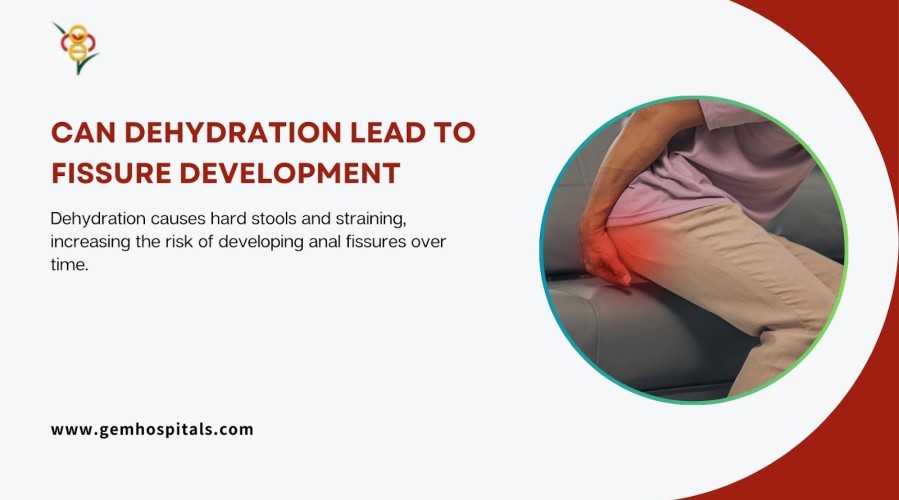Learn effective solutions for digestive problems with expert tips to improve gut health, reduce discomfort, and maintain a healthy digestive system.
Can Dehydration Lead to Fissure Development?

It is surprising, but one of the most important aspects of health is one that people pay little attention to – water intake. This is not only important in order to satisfy the body’s thirst quencher; it is also important to ensure that the body functions properly. Another shocking health implication of dehydration is the development of cracks or what is commonly referred to as fissures, most especially anal fissures. But how does it relate to this uncomfortable condition? Let’s explore.
What Are Fissures?
Fissures are small tears in the lining of sensitive areas, for instance the anal canal. Anal fissures are of two types with the most common being the first type, which can be very painful particularly when passing stool. The signs may comprise sharp pain, itching, and in some cases bleeding is evident. Although cracks can be caused by different reasons, one of the most common causes is pushing during defecation—something that is exacerbated by dehydration.
Role of Hydration in Digestive Health
Drinking water is also important for healthy digestion of the meals that are taken. Water makes the feces to be softer hence passing through the intestines with ease. When the body lacks water, the stool becomes hard and dehydrated and therefore the individual develops constipation. Constipation makes people strain during defecation and this makes them more vulnerable to develop fissures.
In other words, water can be viewed as a kind of oil that eliminates rubbing and tension within the intestines and thus prevents the formation of such pathological phenomena as fissures.
How Dehydration Contributes to Fissure Development
Dehydration affects the body in a number of ways, but when the body lacks water it directs its attention to critical activities such as circulation and other body functions. This means that the colon has less water to work with and hence the feces become more compact. This is because passing hard stools causes some damage to the thin lining of the anal canal.
It also means that the body is unable to heal and this is caused by dehydration. If the skin and tissues in the affected area are not hydrated enough, it will take longer to heal and make fissures’ discomfort last longer.
Signs That Dehydration Might Be Affecting You
If you’re not drinking enough water, your body may show warning signs, including:
- Dry mouth or lips.
- Fatigue or low energy levels.
- Less frequent or dark yellow colored urine production.
- Constipation or the inability to defecate or to do so comfortably.
Some of these symptoms may not appear severe initially but can make you vulnerable to developing fissures when other factors are present.
Preventing Fissures Through Proper Hydration
Fortunately, maintaining adequate hydration can greatly reduce the chances of fissures. Here are some practical tips:
- Drink plenty of water: You should drink at least 8-10 glasses of water per day, but if you are physically active or reside in a hot climate, you should drink even more.
- Include water-rich foods: Water enriched foods such as watermelon, oranges, and cucumbers can help you with your water intake.
- Limit dehydrating drinks: Reduce the intake of fluids such as coffee, tea and alcoholic beverages since they make your body lose more water.
These small changes can help your body maintain good digestion and prevent constipation and fissures.
Additional Tips for Preventing Fissures
While hydration is essential, there are other ways to prevent fissures:
- Eat a high-fiber diet: Take many fruits, vegetables, whole grain foods, beans and other legumes so as to have soft and easily passed stools.
- Stay active: Moderate exercise can help in the movement of bowel and prevent instances of constipation.
- Practice healthy bowel habits: Do not try to pass stool when one is not due, do not force yourself when you are on the toilet.
If you avoid the causes of fissures and maintain these habits along with adequate water intake, you will not have to suffer.
When to Seek Medical Help
If you have signs of fissures that are painful, bleed or are not relieved by home remedies, then you should see a doctor. If one is chronically dehydrated or if fissures recur, then one should seek professional help. A specialist can recommend a course of treatment that will address the causes of the problem and get you on the road to recovery.
One might not think that dehydration is a serious problem, but it can cause a lot of harm to your stomach. To avoid formation of fissures, ensure you take plenty of water, take a balanced diet and have proper bowel movements.
You should consult a health care provider if you are experiencing any of these fissures or similar symptoms. The best doctors and specialists of GEM Hospital are always ready to offer the patients care and efficient treatments.
Blogs & Article
Explore current research trends in digestive health, including new treatments, advanced diagnostics, and innovations improving gut health and patient care.
Discover common digestive health myths and the real facts. Learn simple tips to improve gut health and maintain better digestion for a healthier life.


